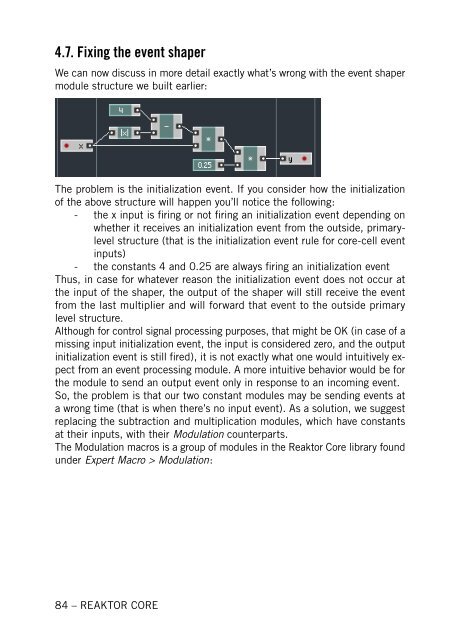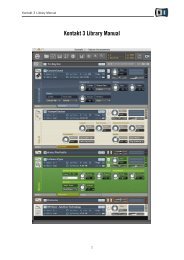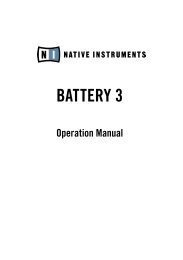1. First steps in Reaktor Core - Native Instruments
1. First steps in Reaktor Core - Native Instruments
1. First steps in Reaktor Core - Native Instruments
You also want an ePaper? Increase the reach of your titles
YUMPU automatically turns print PDFs into web optimized ePapers that Google loves.
4.7. Fix<strong>in</strong>g the event shaper<br />
We can now discuss <strong>in</strong> more detail exactly what’s wrong with the event shaper<br />
module structure we built earlier:<br />
The problem is the <strong>in</strong>itialization event. If you consider how the <strong>in</strong>itialization<br />
of the above structure will happen you’ll notice the follow<strong>in</strong>g:<br />
- the x <strong>in</strong>put is fir<strong>in</strong>g or not fir<strong>in</strong>g an <strong>in</strong>itialization event depend<strong>in</strong>g on<br />
whether it receives an <strong>in</strong>itialization event from the outside, primarylevel<br />
structure (that is the <strong>in</strong>itialization event rule for core-cell event<br />
<strong>in</strong>puts)<br />
- the constants 4 and 0.25 are always fir<strong>in</strong>g an <strong>in</strong>itialization event<br />
Thus, <strong>in</strong> case for whatever reason the <strong>in</strong>itialization event does not occur at<br />
the <strong>in</strong>put of the shaper, the output of the shaper will still receive the event<br />
from the last multiplier and will forward that event to the outside primary<br />
level structure.<br />
Although for control signal process<strong>in</strong>g purposes, that might be OK (<strong>in</strong> case of a<br />
miss<strong>in</strong>g <strong>in</strong>put <strong>in</strong>itialization event, the <strong>in</strong>put is considered zero, and the output<br />
<strong>in</strong>itialization event is still fired), it is not exactly what one would <strong>in</strong>tuitively expect<br />
from an event process<strong>in</strong>g module. A more <strong>in</strong>tuitive behavior would be for<br />
the module to send an output event only <strong>in</strong> response to an <strong>in</strong>com<strong>in</strong>g event.<br />
So, the problem is that our two constant modules may be send<strong>in</strong>g events at<br />
a wrong time (that is when there’s no <strong>in</strong>put event). As a solution, we suggest<br />
replac<strong>in</strong>g the subtraction and multiplication modules, which have constants<br />
at their <strong>in</strong>puts, with their Modulation counterparts.<br />
The Modulation macros is a group of modules <strong>in</strong> the <strong>Reaktor</strong> <strong>Core</strong> library found<br />
under Expert Macro > Modulation:<br />
84 – REAKTOR CORE










